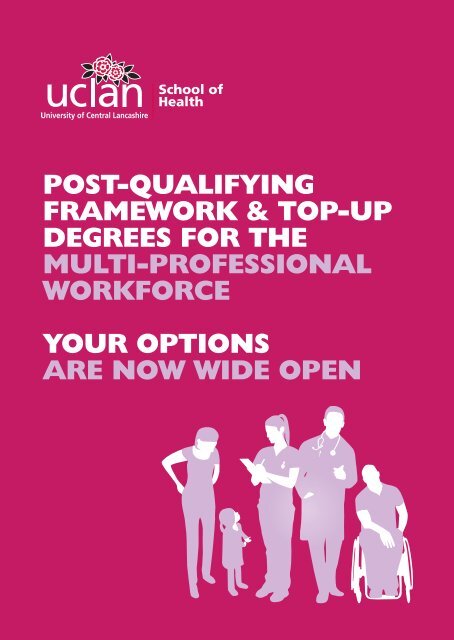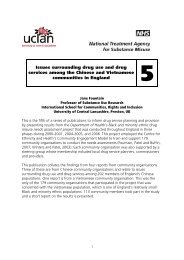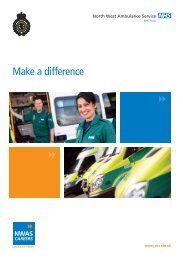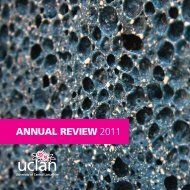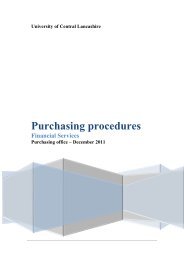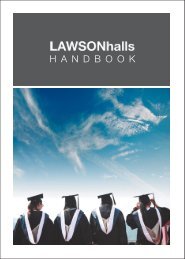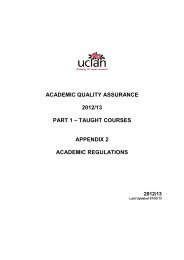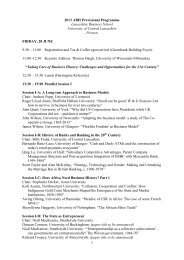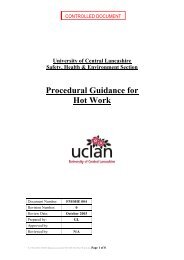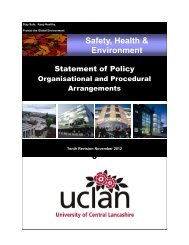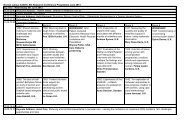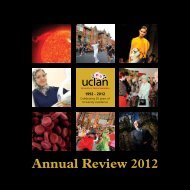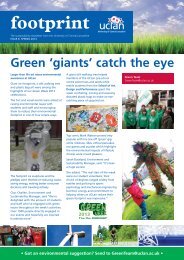Download the PQF Brochure - University of Central Lancashire
Download the PQF Brochure - University of Central Lancashire
Download the PQF Brochure - University of Central Lancashire
Create successful ePaper yourself
Turn your PDF publications into a flip-book with our unique Google optimized e-Paper software.
POST-QUALIFYING<br />
FRAMEWORK & TOP-UP<br />
DEGREES FOR THE<br />
MULTI-PROFESSIONAL<br />
WORKFORCE<br />
YOUR OPTIONS<br />
ARE NOW WIDE OPEN
POST-QUALIFYING FRAMEWORK & TOP-UP DEGREES<br />
FOR THE MULTI-PROFESSIONAL WORKFORCE<br />
POST QUALIFYING<br />
FRAMEWORK (<strong>PQF</strong>)<br />
Our <strong>PQF</strong> <strong>of</strong>fers health and social care practitioners an<br />
opportunity to improve patient care through personal,<br />
pr<strong>of</strong>essional and academic development. Students can select<br />
modules from a comprehensive and contemporary range <strong>of</strong><br />
modules that fit <strong>the</strong>ir personal development and career plans;<br />
ei<strong>the</strong>r on an individual basis or combined in a planned<br />
programme to eventually achieve a degree.<br />
At UCLan we call <strong>the</strong>se degrees ‘top-up degrees’ as <strong>the</strong>y<br />
have been developed mainly to help nurses with diploma<br />
level qualification achieve graduate status. All modules are<br />
at academic level 6 and are available to allied health<br />
practitioners and o<strong>the</strong>r healthcare pr<strong>of</strong>essionals.<br />
General entry requirements for access to top-up degree<br />
• Nursing applicants must be first-level registered nurses<br />
• O<strong>the</strong>r applicants will need to have equivalent health and/or<br />
social care pr<strong>of</strong>essional qualifications<br />
• 240 credits at level 4 and 5<br />
• Students without 120 credits at level 5 may be eligible to<br />
access top-up programmes by developing a portfolio to<br />
demonstrate evidence <strong>of</strong> equivalent entry status.<br />
The School <strong>of</strong> Health <strong>of</strong>fers a range <strong>of</strong> ‘top-up’ honours<br />
degrees (BSc) that use modules within <strong>the</strong> <strong>PQF</strong>, as well as<br />
specialist programmes. These awards include:<br />
• Nursing<br />
• Specialist Community Public Health Nurse - Health Visiting<br />
or School Nursing or Sexual Health Adviser<br />
• Nurse Practitioner<br />
• Community Specialist Practitioner<br />
• Child Health<br />
• Neonatal Practice<br />
• Sexual Health in Practice<br />
• Midwifery Studies<br />
• Psychosocial Mental Health Care<br />
• Critical Care<br />
• Pr<strong>of</strong>essional Practice
BSc(Hons) Nursing<br />
This programme is available full and part-time online (e-learning)<br />
or full-time only taught (on campus) for qualified nurses with a<br />
diploma or equivalent level study who wish to attain a degree in<br />
Nursing. Students do not need to be in practice, but must be<br />
registered practitioners in <strong>the</strong>ir own country.<br />
The programme explores: research and evidence-based practice,<br />
organisational and team working, health and chronic disease,<br />
nursing children and older people. Students engage with global<br />
nursing perspectives and different nursing cultures, developing<br />
<strong>the</strong>ir personal skills in managing care in a changing world.<br />
Collaborative learning is encouraged.<br />
Specific entry requirements<br />
Students must be/have:<br />
• A qualified nurse in <strong>the</strong>ir own country<br />
• UK Diploma level study or equivalent level <strong>of</strong> study, evidence <strong>of</strong><br />
academic attainment equivalent to 120 credits at level 5; this<br />
will be evaluated by <strong>the</strong> course leader and you may be asked<br />
for fur<strong>the</strong>r information to support your application<br />
• English language IELTs with a requirement for a minimal score<br />
<strong>of</strong> 6 in all components for overseas students<br />
Students undertake two core modules:<br />
• Valuing Research<br />
• Dissertation<br />
Plus four optional modules from:<br />
• Policy, Practice and Pr<strong>of</strong>essionalism<br />
• Change for Children: Essentials for all those Working with<br />
Children and Young People<br />
• Determinants <strong>of</strong> Health<br />
• Promoting and Influencing Health<br />
• Promoting Healthy Ageing<br />
• Infection, Prevention and Control Principles<br />
• Management <strong>of</strong> Long Term Conditions<br />
• Developing Leadership Skills<br />
• Multi-pr<strong>of</strong>essional Support <strong>of</strong> Learning and Assessing Practice
POST-QUALIFYING FRAMEWORK & TOP-UP DEGREES<br />
FOR THE MULTI-PROFESSIONAL WORKFORCE<br />
BSc(Hons) Specialist Community Public Health<br />
Nurse - Health Visiting or School Nursing or Sexual<br />
Health Adviser<br />
The aim <strong>of</strong> this programme is to prepare and develop registered<br />
nurses and midwives to meet <strong>the</strong> Nursing and Midwifery Council<br />
(NMC) pr<strong>of</strong>essional standards for specialist community public<br />
health nurses. The course <strong>of</strong>fers <strong>the</strong> opportunity to practice as a<br />
Health Visitor or School Nurse or Sexual Health Adviser.<br />
The programme will enable registration as a Specialist Community<br />
Public Health Nurse (SCPHN) on <strong>the</strong> third part <strong>of</strong> <strong>the</strong> Nursing and<br />
Midwifery register. The course has been mapped to <strong>the</strong> NHS<br />
Knowledge and Skills Framework to assist with career progression.<br />
The course content incorporates <strong>the</strong> key principles <strong>of</strong> public<br />
health practice in <strong>the</strong> context <strong>of</strong> specialist community public<br />
health nursing, grouped into four domains:<br />
• Search for health needs<br />
• Stimulation <strong>of</strong> awareness <strong>of</strong> health needs<br />
• Influences on policies affecting health<br />
• Facilitation <strong>of</strong> health enhancing activities<br />
All students on <strong>the</strong> programme will undertake <strong>the</strong> following core<br />
modules:<br />
• Social Policy in Community Practice (10 credits)<br />
• Principles <strong>of</strong> Public Health (20 credits)<br />
• Valuing Research (20 credits)<br />
• Public Health in SCPHN Practice (20 credits)<br />
• Developing Leadership Skills (20 credits)<br />
Plus for Health Visiting pathway only<br />
• Context <strong>of</strong> Health Visiting Practice (20 credits)<br />
• Consolidation <strong>of</strong> Health Visiting Practice (10 credits)<br />
Plus for School Nursing pathway only<br />
• Context <strong>of</strong> School Nursing Practice (20 credits)<br />
• Consolidation <strong>of</strong> School Nursing Practice (10 credits)<br />
Plus for Sexual Health Adviser pathway only<br />
• Context <strong>of</strong> Sexual Health Adviser Practice (20 credits)<br />
• Consolidation <strong>of</strong> Sexual Health Adviser Practice (10 credits)<br />
There will also be an option module <strong>of</strong> a minimum <strong>of</strong> 10 credits.<br />
Specific entry requirements<br />
• An effective current registration on ei<strong>the</strong>r part one or two <strong>of</strong> <strong>the</strong><br />
NMC register<br />
• Students are required to have a current CRB clearance which<br />
will be organised through your employing organisation<br />
• For 50% <strong>of</strong> <strong>the</strong> course time where you will be in practice you<br />
will be supported by a practice teacher, which is arranged by<br />
<strong>the</strong> NHS Trust
BSc(Hons) Nurse Practitioner<br />
This programme <strong>of</strong> study <strong>of</strong>fers students an exciting<br />
opportunity to study towards becoming an autonomous<br />
practitioner in <strong>the</strong>ir own area <strong>of</strong> clinical practice. The<br />
modules have been mapped against <strong>the</strong> RCN Domains and<br />
Competencies for Nurse Practitioners (2010) and<br />
prepare students to:<br />
• Deliver high quality services<br />
• Admit patients with undifferentiated diagnosis to <strong>the</strong><br />
healthcare system<br />
• Diagnose, initiate and manage treatment and arrange<br />
referral as appropriate<br />
and skills prior to commencing <strong>the</strong> course<br />
There are 2 pathways within this programme both<br />
consisting <strong>of</strong> 6 modules.<br />
Pathway 1:<br />
• Theories Underpinning <strong>the</strong> Consultation Process<br />
• Pathophysiology Applied to Practice<br />
• Comprehensive Patient Assessment and Diagnosis (A)<br />
• Comprehensive Patient Assessment and Diagnosis (B)<br />
• Non-Medical Prescribing (40 credits - equivalent to 2<br />
modules)<br />
Pathway 2:<br />
• Valuing Research<br />
• Theories Underpinning <strong>the</strong> Consultation Process<br />
• Pathophysiology Applied to Practice<br />
• Comprehensive Patient Assessment and Diagnosis (A)<br />
• Comprehensive Patient Assessment and Diagnosis (B)<br />
• Practice Based Study<br />
Specific entry requirements<br />
Students should:<br />
• Expect to study at <strong>the</strong> <strong>University</strong> for approximately one<br />
day every o<strong>the</strong>r week, with a period <strong>of</strong> time (e.g. half a<br />
day) during <strong>the</strong> alternate weeks, with <strong>the</strong> student’s<br />
practice supporter<br />
• There is also an expectation for between 5-10 hours a<br />
week in private study<br />
• Be working within a care setting where <strong>the</strong>re is demand<br />
and exposure to a wide range <strong>of</strong> clinical consultations<br />
• Be working a minimum <strong>of</strong> 18.5 hours a week in an<br />
appropriate healthcare setting<br />
• Identify a Practice Supporter within <strong>the</strong>ir clinical setting<br />
who is able to assist with <strong>the</strong>ir development <strong>of</strong> knowledge
POST-QUALIFYING FRAMEWORK & TOP-UP DEGREES<br />
FOR THE MULTI-PROFESSIONAL WORKFORCE<br />
BSc(Hons) / PGDip Community Specialist Practitioner<br />
The aim <strong>of</strong> this programme is to prepare and develop<br />
registered nurses and midwives to meet <strong>the</strong> Nursing and<br />
Midwifery Council (NMC) pr<strong>of</strong>essional standards for specialist<br />
community practitioner (General Practice Nursing, Community<br />
Children’s Nursing or Nursing in <strong>the</strong> Home) (UKCC 2001) and<br />
<strong>the</strong> ‘Standards for Approval <strong>of</strong> Higher Education Institutions<br />
and Programmes’ (ENB 1997).<br />
The programme incorporates <strong>the</strong> key principles <strong>of</strong> specialist<br />
practice and is grouped into four domains:<br />
• clinical practice<br />
• care and programme management<br />
• clinical practice development<br />
• clinical practice leadership<br />
Applicants must have <strong>the</strong> support <strong>of</strong> <strong>the</strong>ir NHS Trust/<br />
employer.<br />
All students on <strong>the</strong> programme will undertake <strong>the</strong><br />
following modules:<br />
• Social Policy in Community Practice (10 credits)<br />
• Principles <strong>of</strong> Public Health (10 credits)<br />
• Valuing Research (20 credits)<br />
• Practice Based Study (20 credits)<br />
• Developing Leadership Skills (20 credits)<br />
• Context <strong>of</strong> Community Specialist Practice (20 credits)<br />
This equates with 100 credits for all pathways except<br />
Community Nursing in <strong>the</strong> Home where students will also<br />
undertake an additional compulsory 10 credits through<br />
completing V100 Community Practitioner Prescribing.<br />
A fur<strong>the</strong>r 20 credit option module (minimum <strong>of</strong> 10 credits<br />
for Community Nursing in <strong>the</strong> Home students) is required to<br />
complete <strong>the</strong> award.Your Specialist Practice qualification<br />
can be recorded on <strong>the</strong> NMC Register, as can your V100<br />
Prescribing award if you have also successfully completed<br />
this module within <strong>the</strong> programme.<br />
The full-time programme will be delivered over a minimum<br />
<strong>of</strong> 40 weeks, including fixed annual leave. A part-time option<br />
is also available and this can be completed over 2, 3 or 4 years<br />
as appropriate.<br />
In practice support <strong>of</strong> a named mentor / practice teacher is<br />
arranged by <strong>the</strong> seconding / sponsoring NHS Trust / employer.<br />
Specific entry requirements<br />
• An effective appropriate 1st level registration on <strong>the</strong> NMC<br />
pr<strong>of</strong>essional register in respect <strong>of</strong> <strong>the</strong> route <strong>the</strong>y wish to<br />
take, as follows:<br />
• General Practice Nursing: entry on sub part 1: Adult - RN1<br />
or RNA or Child - RN8 or RNC<br />
• Community Mental Health Nursing: entry on sub part 1:<br />
Mental Health - RN3 or RNMH<br />
• Community Children's Nursing: entry on sub part 1: Child -<br />
RN8 or RNC<br />
• Community Nursing in <strong>the</strong> Home: entry on sub part 1:<br />
Adult - RN1 or RNA<br />
• The ability to be self-funding or have <strong>the</strong> commitment <strong>of</strong><br />
your employer to support course fees<br />
• Your manager’s support for <strong>the</strong> course (where appropriate)<br />
• You are required to have a current CRB clearance which will<br />
be organised through your employing organisation
BSc(Hons)<br />
Child Health<br />
This BSc(Hons) Child Health programme is specially designed for<br />
children’s nurses or nurses/healthcare pr<strong>of</strong>essionals who work<br />
with children, young people and families to explore healthcare<br />
issues within <strong>the</strong> remit <strong>of</strong> <strong>the</strong>ir individual area <strong>of</strong> practice, with a<br />
focus on child healthcare including partnership working and<br />
delivery <strong>of</strong> client-led services. The aim <strong>of</strong> <strong>the</strong> programme is to<br />
enhance <strong>the</strong> student’s pr<strong>of</strong>essional knowledge and competencies<br />
to cope with <strong>the</strong> demands and complexities <strong>of</strong> practice, working<br />
within health and social care environments with children, young<br />
people and <strong>the</strong>ir families. The programme will enable practitioners<br />
to critically reflect on <strong>the</strong>ir clinical competence; expand <strong>the</strong>ir<br />
clinical capability within <strong>the</strong> multidisciplinary team, and participate<br />
in developing and promoting appropriate practice development to<br />
facilitate <strong>the</strong> delivery <strong>of</strong> quality care.<br />
Students undertake three compulsory modules:<br />
• Valuing Research<br />
• Safeguarding and Protection <strong>of</strong> Children<br />
• Dissertation or Practice Based Study<br />
Plus four optional modules from a range that relate to different<br />
areas <strong>of</strong> child health practice, including:<br />
• Enhancing Practice: Child and Adolescent Mental Health<br />
• Children's Complex Care<br />
• Responding to Acutely Ill Children and Young People<br />
• Care <strong>of</strong> <strong>the</strong> Highly Dependent Child<br />
• Shaping <strong>the</strong> Future for Children's Nursing Practice<br />
Specific entry requirements<br />
• Interested students must be working within a relevant child<br />
healthcare area, with children/young people, <strong>the</strong>ir carers and<br />
families<br />
• Nursing applicants must be first-level registered nurses<br />
• O<strong>the</strong>r applicants will need to have equivalent health and/or<br />
social care pr<strong>of</strong>essional qualifications
POST-QUALIFYING FRAMEWORK & TOP-UP DEGREES<br />
FOR THE MULTI-PROFESSIONAL WORKFORCE<br />
BSc(Hons)<br />
Neonatal Practice<br />
This programme is designed to equip neonatal nurses and<br />
midwives with <strong>the</strong> underpinning knowledge to develop<br />
<strong>the</strong>ir practice and competence in <strong>the</strong> field <strong>of</strong> neonatal care<br />
within a developmental care and family centred framework.<br />
Depending on entry qualifications students undertake seven<br />
compulsory modules:<br />
• Foundations <strong>of</strong> Practice in Low Dependency Care <strong>of</strong> <strong>the</strong><br />
Neonate<br />
• Current Perspectives in High Dependency Neonatal Care<br />
• Contemporary Management in Intensive Care <strong>of</strong> <strong>the</strong><br />
Neonate<br />
• Mentorship in Practice<br />
• Neonatal Care: A Developmental Perspective<br />
• Leadership and Organisational Development<br />
• Dissertation<br />
Plus 1-2 optional modules from a range including:<br />
• Substance Use: Effects on <strong>the</strong> Pregnant Woman and her Baby<br />
• Community Care <strong>of</strong> <strong>the</strong> Neonate<br />
• Neonatal Vascular Access: Principles <strong>of</strong> Management<br />
• Maternal and Infant Nutrition: Bio-cultural Perspectives<br />
• Antenatal and Neonatal Screening: Current Perspectives<br />
• Presentation and Teaching Skills<br />
• Student Initiated Half Credit<br />
• Student Initiated Full Credit<br />
Not all modules are <strong>of</strong>fered every year.<br />
Specific entry requirements<br />
• First level nurse or midwife currently actively registered<br />
on <strong>the</strong> NMC register<br />
• Working within a neonatal care environment in a role<br />
that allows <strong>the</strong>m to gain clinical competency
BSc(Hons) Sexual<br />
Health in Practice<br />
The aim <strong>of</strong> this programme is to increase <strong>the</strong> Sexual Health<br />
practitioner’s ability to give safe, competent holistic care<br />
and to be able to extend and innovate that care through<br />
research-based reflective practice and effective care management.<br />
The programme will enable practitioners to develop and apply<br />
specialist knowledge to skills in <strong>the</strong> care and management <strong>of</strong><br />
clients accessing contraception and sexual health services for<br />
<strong>the</strong> asymptomatic screening <strong>of</strong> sexually transmitted infections<br />
and HIV.<br />
Students undertake nine compulsory modules:<br />
• Contraception and Asymptomatic Screening for Sexually<br />
Transmitted Infections and HIV (<strong>the</strong>ory and practice)<br />
(60 credits - equivalent to 3 modules)<br />
• Effective Communication and Engagement in Sexual Health<br />
• Research in Practice<br />
• Sexual Health Promotion<br />
• Leadership and Organisational Development<br />
• Dissertation (40 credits - equivalent to 2 modules)<br />
Plus three optional modules from a range that addresses <strong>the</strong><br />
development <strong>of</strong> a ‘practitioner led’ practice including:<br />
• Cervical Cytology Screening<br />
• Sexual Health for Teenagers<br />
• Men’s Sexual Health<br />
• First Issuing <strong>of</strong> Hormonal Contraception<br />
• Prevention and Management <strong>of</strong> Unplanned Pregnancy<br />
• Management <strong>of</strong> Individuals Affected by STI’s and Blood<br />
Borne Virus<br />
Specific entry requirements<br />
• First level nurse, midwife, specialist community public<br />
health nurse with a current registration on <strong>the</strong> NMC<br />
register<br />
• Practitioners that are working in a role that allows <strong>the</strong>m<br />
to gain clinical competency<br />
• Ability to study at level 5
POST-QUALIFYING FRAMEWORK & TOP-UP DEGREES<br />
FOR THE MULTI-PROFESSIONAL WORKFORCE<br />
BSc(Hons) Midwifery<br />
Studies<br />
Due to <strong>the</strong> changing and expanding role <strong>of</strong> <strong>the</strong> midwife, this<br />
programme has been designed to enable students to focus on<br />
areas relevant to <strong>the</strong>ir practice, and career aspirations.<br />
Students undertake one core module:<br />
• Dissertation<br />
Plus five optional modules from a range including:<br />
• Antenatal and Neonatal Screening - Current Perspectives<br />
• Community Care <strong>of</strong> <strong>the</strong> Neonate<br />
• Contemporary Issues in Midwifery Practice<br />
• Contraception and Sexual Health Update<br />
• Critical Care in Pregnancy and Childbirth<br />
• Ethics and Law in Midwifery<br />
• Examination <strong>of</strong> <strong>the</strong> Newborn<br />
• Grief and Loss in Maternity Services<br />
• Health Promotion within Sexual Health<br />
• Leadership and Organisational Development<br />
• Maternal and Infant Nutrition: Bio-cultural Perspectives<br />
• Multipr<strong>of</strong>essional Support <strong>of</strong> Learning and Assessing in Practice<br />
• Presentation and Teaching Skills<br />
• Principles <strong>of</strong> Contraception and Fertility<br />
• Principles <strong>of</strong> Sexual Health and STIs<br />
• Pr<strong>of</strong>essional Practice and Public Protection – Old Values,<br />
New Culture<br />
• Public Health and <strong>the</strong> Midwife<br />
• Research in Practice, or Research in Midwifery<br />
• Sexual Health for Teenagers<br />
• Sign-Off Mentorship<br />
• Student Initiated module<br />
• Substance Use: Effects on <strong>the</strong> Pregnant Woman and her Baby<br />
Specific entry requirements<br />
• Registered as a midwife on <strong>the</strong> NMC Pr<strong>of</strong>essional Register<br />
• Currently practicing as a midwife to <strong>the</strong> equivalent <strong>of</strong> 6 hours<br />
per week in an area that allows students to meet module<br />
learning outcomes<br />
• DipHE in Midwifery or midwifery related topic or equivalent<br />
to a minimum <strong>of</strong> 100 level 5 credits obtained within <strong>the</strong> last<br />
5 years
BSc(Hons) Psychosocial Mental Health Care<br />
Psychosocial Interventions<br />
This Honours degree was developed as a direct response<br />
to national drivers, including <strong>the</strong> NICE guidelines for<br />
schizophrenia and substance misuse, <strong>the</strong> Policy<br />
Implementation Guide for Acute Mental Health Care, as<br />
well as government directives to increase access to<br />
psychological <strong>the</strong>rapies and carers.<br />
These, along with a recovery based approach, pr<strong>of</strong>essional<br />
statements and wider agendas for health and social care are<br />
just some <strong>of</strong> <strong>the</strong> guiding principles underpinning <strong>the</strong> delivery<br />
<strong>of</strong> <strong>the</strong> course.<br />
Options<br />
• Advanced Certificate Psychosocial Mental Health Care<br />
2 core modules: one focusing on <strong>the</strong> process from<br />
engagement and assessment to formulation and <strong>the</strong><br />
second on <strong>the</strong>rapeutic interventions and <strong>the</strong> development<br />
<strong>of</strong> clinical skills in <strong>the</strong> delivery <strong>of</strong> individual work.<br />
• Graduate Certificate Psychosocial Mental Health Care<br />
4 core modules, 3 <strong>of</strong> which are clinically focused. The core<br />
modules are designed to provide students with <strong>the</strong><br />
knowledge and skills necessary to work holistically with<br />
complex clients and <strong>the</strong>ir families/carers.<br />
Specific entry requirements<br />
• Applicants must have 240 credits, 120 <strong>of</strong> which must be at<br />
level 5 (Diploma level)<br />
• They must also have a Health or Social Care pr<strong>of</strong>essional<br />
qualification and be currently employed within that field<br />
working with adults with severe and enduring mental<br />
illness<br />
• Students are required to have organisational backing to<br />
attend <strong>the</strong> course, be able to set aside 1 day per week for<br />
clinical practice and have a named suitably qualified<br />
clinical supervisor<br />
<strong>University</strong> Attendance<br />
The degree is one study day per week for <strong>the</strong> taught<br />
modules running in year 1 from September until May. In<br />
year 2 students complete <strong>the</strong> Practice Project for which<br />
<strong>the</strong>y attend <strong>University</strong> for half a day per week and receive<br />
individual academic supervision.<br />
The Graduate Certificate includes all <strong>of</strong> <strong>the</strong> taught modules<br />
running September until May.<br />
The Advanced Certificate is half a day per week September<br />
until May.<br />
• BSc (Hons) Psychosocial Mental Health Care<br />
6 modules are studied in total, including a practice<br />
development project.<br />
The course is for:<br />
• Pr<strong>of</strong>essionally qualified Health and Social care staff<br />
• Typically Mental Health Nurses, Occupational Therapists,<br />
Social workers<br />
• Working with adults experiencing severe and enduring<br />
mental illness<br />
• Organisational support for study time and supervised<br />
clinical practice
POST-QUALIFYING FRAMEWORK & TOP-UP DEGREES<br />
FOR THE MULTI-PROFESSIONAL WORKFORCE<br />
Advanced Certificate<br />
Critical Care<br />
The Advanced Certificate Critical Care award allows students<br />
to create a personalised, flexible programme <strong>of</strong> study that<br />
meets personal, pr<strong>of</strong>essional and organisational requirements<br />
whilst working towards a recognised academic qualification;<br />
<strong>the</strong> student can choose any two from more than twenty<br />
different modules. It is important to note that students who<br />
do not work within ‘critical care’, but from care homes,<br />
general medical and surgical environment can access many<br />
<strong>of</strong> <strong>the</strong> modules within this award.<br />
The award has been designed to provide students with <strong>the</strong><br />
opportunity to share pr<strong>of</strong>essional knowledge and insight.<br />
Collectively <strong>the</strong> modules build depth and breadth to learning<br />
and development, leading to achievement <strong>of</strong> <strong>the</strong> course<br />
learning outcomes. The course will encourage students to<br />
become ‘lifelong’ learners, one who is eager to continue to<br />
learn and promote health care values and contribute to <strong>the</strong><br />
development <strong>of</strong> evidence-based practice and effective clinical<br />
outcomes. Students may wish to use <strong>the</strong> modules within this<br />
programme towards <strong>the</strong> BSc(Hons) Pr<strong>of</strong>essional Practice.<br />
The Advanced Certificate in Critical Care is <strong>of</strong>fered at level 6<br />
and provides a flexible route <strong>of</strong> study. Students may choose<br />
to select two modules in <strong>the</strong>ir current specialist area e.g.<br />
NU3250 and NU3251 (Urgent and Emergency Care), or may<br />
choose to pick two modules that are relevant to <strong>the</strong>ir current<br />
practice. For example <strong>the</strong> student may be involved in caring<br />
for those in a clinical medical environment and for those who<br />
also have neuromedical disorders. They may choose to<br />
undertake NU3082 and NU3640. For <strong>the</strong> full module listing<br />
go to: http://www.uclan.ac.uk/criticalcare<br />
Specific entry requirements<br />
• Students must be registered practitioners, working within<br />
a clinical care setting appropriate to <strong>the</strong> outcome award<br />
for a minimum <strong>of</strong> six months, be contracted to work for<br />
at least 18 hours per week and are required to be<br />
supported by <strong>the</strong>ir manager and may need to identify a<br />
clinical mentor for particular modules<br />
• Pre-registration diplomas and baccalaureate graduates<br />
must demonstrate 12 months clinical experience to be<br />
eligible for this course<br />
BSc(Hons)<br />
Pr<strong>of</strong>essional Practice<br />
Students can accumulate credit from a portfolio <strong>of</strong> over<br />
eighty modules to achieve 120 credits at level 6.<br />
This is a top-up degree <strong>of</strong>fering a wide range <strong>of</strong> choices to<br />
help practitioners:<br />
• develop <strong>the</strong>ir career<br />
• enhance <strong>the</strong>ir knowledge and skills<br />
• gain an academic qualification<br />
• develop and promote practice development<br />
As a busy practitioner, you will be able to pace your study to<br />
suit you – you have up to five years to complete <strong>the</strong> top-up<br />
degree.<br />
You will be required to undertake two core modules:<br />
• Valuing Research<br />
• Practice Based Study<br />
Plus four optional modules selected from <strong>the</strong> wide range<br />
available to suit practitioners wherever <strong>the</strong>ir area <strong>of</strong><br />
practice may be. See module information for specific details.<br />
A number <strong>of</strong> modules can be studied online.<br />
Student portfolio<br />
Students are required to produce a portfolio to evidence<br />
<strong>the</strong> integration <strong>of</strong> <strong>the</strong>ory and practice throughout <strong>the</strong><br />
programme.<br />
Specific entry requirements<br />
• You will need to be in practice, and working a minimum<br />
<strong>of</strong> 18.5 hrs per week
BSc(Hons) Pr<strong>of</strong>essional Practice<br />
MODULE LISTING<br />
CLINICAL KNOWLEDGE AND SKILLS ENHANCEMENT<br />
Code Module Title Credits<br />
NU3065 Advanced management <strong>of</strong> asthma and COPD 20<br />
NU3057 Assessing patients with renal impairment 20<br />
NU3172 Assessment and monitoring in <strong>the</strong> intensive care patient 20<br />
NU3646 Assisting <strong>the</strong> surgeon during surgical procedures 20<br />
NU3644 Cancer, cancer treatment and symptom management 20<br />
NU3637 Cardiac dysrhythmias 20<br />
NU3194 Care management at <strong>the</strong> end <strong>of</strong> life 20<br />
NU3632 Care <strong>of</strong> <strong>the</strong> anaes<strong>the</strong>tised patient 20<br />
NU3645 Care <strong>of</strong> <strong>the</strong> intraoperative patient 20<br />
NU3631 Care <strong>of</strong> <strong>the</strong> patient following anaes<strong>the</strong>sia and surgery 20<br />
NU3647 Care strategies for managing <strong>the</strong> acutely ill patient 20<br />
NU3642 Communication in life-threatening illness 20<br />
NU3630 Concepts <strong>of</strong> community practice 20<br />
NU3636 Continuing cardiac care 20<br />
NU3638 Coronary heart disease: causes, manifestations and management 20<br />
NU3174 Current contexts <strong>of</strong> critical care unit practice* 20<br />
NP3041 Developing practice in diabetes management 40<br />
NU3640 Enhancing care for people with neuromedical disorders 20<br />
NU3250 Essentials <strong>of</strong> emergency care 20<br />
NU3326 or NU3327 by e-learning Infection prevention and control principles 20<br />
NU3122 Introduction to chronic oedema management 20<br />
NU3650 Leg ulcer care and management 20<br />
NU3180 Management <strong>of</strong> adult bowel dysfunction 20<br />
NU3186 Management <strong>of</strong> dialysis prescriptions* 20<br />
NU3026 or NU3329 by e-learning Management <strong>of</strong> long term conditions 20<br />
NU3620 Management <strong>of</strong> same day consultation in primary care 20<br />
NU3181 Management <strong>of</strong> urinary continence care 20<br />
NU3173 Managing care delivery <strong>of</strong> <strong>the</strong> intensive care patients 20<br />
NU3187 Musculoskeletal assessment 20<br />
NU3639 Neurosurgical care and trauma management* 20<br />
NU3039 Nutritional support and decision making in practice 20<br />
NU3188 Orthopaedic and skeletal trauma management 20<br />
NU3041 Palliative care practice 40<br />
NU3075 Pathophysiology applied to practice 20<br />
NU3643 Person focused cancer care and <strong>the</strong> patient journey (pre-requisite is NU3644) 20<br />
NU3099 Patient safety: harm free care 20<br />
NU3265 or NU3266 by e-learning Policy, practice and pr<strong>of</strong>essionalism 20<br />
NU3655 Principles and practice <strong>of</strong> cytotoxic chemo<strong>the</strong>rapy and biological <strong>the</strong>rapy administration 40<br />
NU3626 Principles and practice <strong>of</strong> triage 20<br />
NU3197 Principles <strong>of</strong> safe perioperative practice and management 20<br />
NU3135 Principles <strong>of</strong> stroke practice 20<br />
NU3323 or NU3324 by e-learning Promoting healthy ageing 20<br />
NU3185 Quality perspectives in renal impairment 20<br />
NU3082 Recognising and responding to deterioration in <strong>the</strong> acutely ill patient 20<br />
NU3081 Safe and effective transfer <strong>of</strong> patients 20<br />
NU3058 Support in renal care and treatment 20<br />
NU3193 The principles and practice <strong>of</strong> tissue viability 40<br />
NU3251 Trauma care and resuscitation 20<br />
NU3641 Treatment and care in haematological disease 20
POST-QUALIFYING FRAMEWORK & TOP-UP DEGREES<br />
FOR THE MULTI-PROFESSIONAL WORKFORCE<br />
MODULE LISTING<br />
MENTAL HEALTH CARE AND THERAPY<br />
Code Module Title Credits<br />
NU3311 Caring for people with dementia 40<br />
NU3070 Cognitive behavioural interventions for anxiety and depression 40<br />
NU3090 Dual diagnosis: substance misuse and mental health co-morbidity 20<br />
NU3161 Enhancing capability for working with personality disorder 20<br />
NU3024 Enhancing practice in child and adolescent mental health 40<br />
NU3032 Enhancing solution focused practice (pre-requisite is NU3307) 20<br />
NU3019 Managing teams, relationships and environments 20<br />
NU3609 Self harming behaviours 20<br />
NU3307 Solution focused interventions 20<br />
NU3008 The concepts <strong>of</strong> promoting physical health in enduring mental illness 40<br />
NU3309 Theoretical context <strong>of</strong> personality disorder 20<br />
NU3551 Working with individuals from assessment to formulation 20<br />
NU3633 Working with violence and aggression 20<br />
CHILDREN, PUBLIC AND FAMILY HEALTH<br />
Code Module Title Credits<br />
NU3049 Care <strong>of</strong> <strong>the</strong> highly dependent child 20<br />
NU3253 or NU3267 by e-learning Change for children: essentials for all those working with children and young people 20<br />
NU3055 or NU3068 by e-learning Children's complex care 20<br />
NU3255 Children’s trauma care and resuscitation 20<br />
NU3315 or NU3316 by e-learning Determinants <strong>of</strong> health 20<br />
NU3024 Enhancing practice in child and adolescent mental health 40<br />
NU3317 or NU3318 by e-learning Promoting and influencing health 20<br />
NU3236 Principles <strong>of</strong> public health 10<br />
NU3254 Responding to acutely ill children and young people requiring urgent or emergency care 20<br />
NU3034 Safeguarding and protection <strong>of</strong> children 20<br />
NU3800 Safeguarding children 10<br />
NU3270 Safeguarding vulnerable adults 20<br />
NU3048 Shaping <strong>the</strong> future for children’s nursing practice 20<br />
NU3235 Social policy in community practice 10<br />
NU3801 Working with parents to support family wellbeing 10<br />
PERSONAL PROFESSIONAL DEVELOPMENT<br />
Code Module Title Credits<br />
NU3190 by e-learning Clinical supervison for health and social care practice 20<br />
NU3268 or NU3269 by e-learning Developing leadership skills 20<br />
NU3096 or NU3097 by e-learning Multipr<strong>of</strong>essional support <strong>of</strong> learning and assessing practice 20<br />
NU3265 or NU3266 by e-learning Policy, practice and pr<strong>of</strong>essionalism 20<br />
NU3192 Practice based study - core module (must be undertaken in last year <strong>of</strong> study) 20<br />
NP3306 Student initiated module 20<br />
NU3047 or NU3059 by e-learning Valuing research - core module 20<br />
*An e-learning option may be available from May 2012.<br />
Many <strong>of</strong> <strong>the</strong>se modules can also be studied as a standalone option to gain specific skills or knowledge <strong>of</strong> <strong>the</strong> subject.
POST-QUALIFYING FRAMEWORK<br />
& TOP-UP DEGREES FOR THE<br />
MULTI-PROFESSIONAL WORKFORCE<br />
Fur<strong>the</strong>r information on all <strong>the</strong> modules is available at:<br />
www.uclan.ac.uk/health
YOUR OPTIONS<br />
ARE NOW WIDE OPEN<br />
For fur<strong>the</strong>r information and details <strong>of</strong> how to apply contact:<br />
Post-Registration Recruitment<br />
NHS Contracts Unit<br />
School <strong>of</strong> Health<br />
<strong>University</strong> <strong>of</strong> <strong>Central</strong> <strong>Lancashire</strong><br />
Preston PR1 2HE<br />
Tel: 01772 893836 / 893839<br />
Email: nursingcpd@uclan.ac.uk<br />
www.uclan.ac.uk/health


